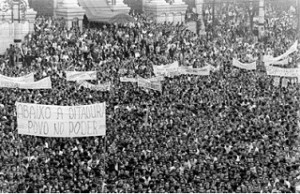
Arquivo para April 15th, 2016
Brazilians’70 the military dictatorship
Students main points of resistance to the military coup, was the headquarters of UNE (National Union of Students) invaded and burnt down and went underground in the Northeast people linked to the Peasant Leagues were persecuted as well as most of the trade unions and federations of workers.
the headquarters of UNE (National Union of Students) invaded and burnt down and went underground in the Northeast people linked to the Peasant Leagues were persecuted as well as most of the trade unions and federations of workers.
Was organized the Brazilian National Information Service (SNI) in order to “collect and analyze information relevant to national security, counter-information and information about internal subversion issues” as textual quote from historian Boris Fausto.
The AI-1 (first Institutional Act) established the election of a new president of Brazil, for voting by the National Congress, was elected General Humberto de Alencar Castelo Branco, who was in favor of a “restricted democracy”, was released a Plan of Government action by ministers Roberto Campos and Octavio Bulhões Planning of Finance.
The AI-2 extinguished the parties and created the Arena (National Renewal Alliance) controlled by the military and the MDB (Brazilian Democratic Movement) where he took refuge almost all opposition, because a part of it left for clandestinity and armed struggle.
Outside Carlos Lacerda, traditional enemy of Jango and Juscelino allied forming a Frente Amplio in the country some bishops of the Catholic Church as the priest Helder Camara raised their voice against the lack of democracy and affirmation of the rights of workers.
In 1968 protests gained momentum, with the death of a student, getting to make a march called 100 thousand, but repression was violent with death, torture and December 13, 1968, Costa e Silva succeeded Castelo Branco, decrees I-5 closes the National Congress and starts a cassation cycle mandates of the toughest opposition.
In August 1969, Costa e Silva suffers a stroke and the replacement would be Pedro Aleixo, a civilian deputy, is by General Emilio Garrastazu Medici, with the Vice Minister of the Navy, Augusto Redemaker were years of “national territory banishment” , executions and torture in organs of the Navy and DOI-CODI, while the country grew by 11.2% fees and 10% of GDP came to be called “Brazilian miracle”, won a World Cup in 1970.
But the hidden aspect of the miracle was the workers’ crunch, the minimum wage fell by almost 60% and health indicators, education and housing were very low.
In 1973, General Ernesto Geisel, who had been president of Petrobras, began what he called “opening slow and gradual policy”, an amendment to the constitution allowed his choice by delegates of the Legislative Assemblies of the States, repression and torture were wearing the military governments and the death of journalist Vladimir Herzog and student Alexandre Vannuchi Leme trigger struggles for democratization.

